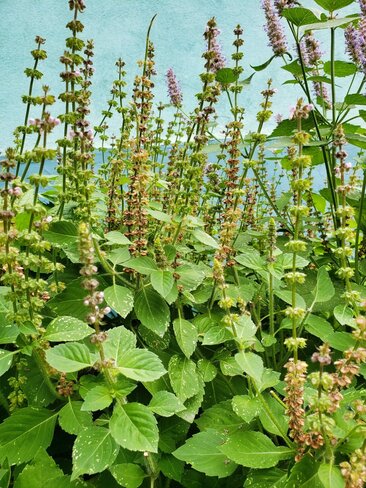 Tulsi in our garden, with anise hyssop too. Tulsi in our garden, with anise hyssop too. By Susan Staley, Clinical Herbalist There’s a lot of talk about adaptogens out there. You may notice an increasing number of foods and beverages advertising that they contain adaptogens. Maybe even your cousin is suggesting you start working with them. But what qualifies an herb as adaptogenic? What is an adaptogen and why might someone consider incorporating one or more of these important plants into their life? What herbs truly adaptogens? And what makes them unique from each other? The term “adaptogen” is a fairly recently identified plant action, perhaps coined in the early 1940’s, although the idea and value of these plants comes from the East and has long been understood. Adaptogenic plants behave in a non-specific way, meaning they support general balance and vitality in the body. They help a person to “adapt” better to the inevitable changes and stressors of life- especially the big ones with some kind of beginning and ending like a big project or moving. The source of the stress may be emotional, environmental, physical, or mental. We perceive the challenge the same way on the inside. They are also considered to be non-toxic and normalizing (meaning helps the body and the individual return to health and balance). Until recently, perhaps the most well-known adaptogen was Ginseng- whether American or Asian. Ginseng immediately brings to mind words like “longevity” and “vitality”, perhaps even “magical”. Many adaptogenic plants are roots. Like roots, the right adaptogen(s) for an individual, in the right amount, can make one feel grounded while the winds of life blow about them. When harvesting roots, most often the entire plant must be taken, unlike a berry or leaf. This is good to keep in mind when considering sourcing and sustainability in regards to the herbs you decide to work with. Ashwagandha, Rhodiola, Licorice, Eluethero, and the Ginsengs are all adaptogenic roots. Tulsi and Jiao Gulan are leafy adaptogens. Schisandra is a bright little berry adaptogen, and many consider Reishi mushroom to be adaptogenic. Adaptogenic plants help us to support our vitality and resiliency, especially when combined with nourishing food, rest, and other lifestyle factors. They pair well with nervine plants, especially those of the tonic and relaxant variety like Skullcap, Milky Oats, Chamomile, Passionflower, Anise Hyssop, and Linden. In fact, often plants that support the nervous system and cardiovascular system are a good place to go for support in the face of increasing stress before introducing adaptogens. If you’re feeling the call of the adaptogens, remember that plants, like humans, are all different from one another. Adaptogens each have their own character, gifts, and affinities towards different body systems, functions, and even emotional qualities. For example Ashwagandha is building, strengthening, and helps with healthy sleep- so nice in the evening, although the plant does not cause drowsiness. Rhodiola is a stimulating adaptogen that energizes body and mind, is drying in quality, and best taken in the morning. And Tulsi makes for a delicious tea, supports digestion and immune function, and enhances feelings of inspiration and peace. To find the adaptogens best suited for you, try speaking with an herbalist, reading texts that help differentiate their gifts and your needs, and start preparing some whole plant preparations at home and listen to your body for cues that you’re on the right track.
0 Comments
|
Details
RAILYARDCheck in here to keep updated on news and activities at the apothecary. Archives
April 2024
Categories
All
|
railyard apothecary
*These statements have not been evaluated by the Food and Drug Administration. This product is not intended to diagnose, treat, cure, or prevent any disease. For educational purposes only.
|
|

 RSS Feed
RSS Feed
